- Home
- Thomas DePrima
Castle Vroman Page 16
Castle Vroman Read online
Page 16
"It looks like a young Alioramus didn't make it across."
Examining the bone after the Commander was done, Chief Corinth said, "Sir, it looks like something's been chewing on this. The bone isn't smooth; it has tiny cuts all over it."
"Let me see it again, Chief," Fannon said, this time giving it a very close look. "You're right. It looks like it was stripped clean by something with very sharp teeth."
"Do you suppose it was something that waded in to eat, or something that swam to the shore to dine? For that matter, if the dinosaur was okay before he went into the water, what if he didn't drown?"
Fannon looked intently at the young chief petty officer, then at the river. "Uh, I think we'll postpone our crossing until we know. I'd hate to be attacked in the middle of that river by creatures just waiting for something edible to jump in. Let's follow the shoreline north for a ways. Everyone keep their eyes open for anything unusual in the river, but don't ignore the forest."
Still following the river hours later, they rounded a bend and surprised a large herd of grazing gelks. Some of the animals stood their ground and stared at the approaching gelks with the strange things on their backs, but others panicked and fled in different directions. One young gelk ran into the river, but stopped as if suddenly aware that in its fear it had erred. It was too late! Something pulled the animal's feet out from under it and it disappeared beneath violently churning water. A stain of red foam and bubbles continued to spread quickly across the surface minutes later as the water returned to its tranquil appearance in all other respects.
Fannon looked at his team, all of whom had witnessed the spectacle, and said, "I guess we'd better not enter the water under any circumstances."
"What was that, sir?" Chief Corinth asked.
"I didn't see anything, Chief, except the gelk. We don't even know if it was one creature in the water, or many. However, we do know that we probably wouldn't stand any better chance than that gelk if we go in. Even if a dino comes along, I'm not going into the water."
"Aye, sir. I'll take my chances on land as well."
As they broke camp on the seventh day, Fannon made the decision to begin the trip home, but they would follow a different route back. Swinging south from their encampment, they descended into a misty valley containing trees still bearing ripe fruit. The temperature continued to climb with each passing kilometer until they at last reached the floor of the basin and encountered a series of hot springs. They had already removed their heavy winter clothing, and sweat dripped from every pore. The bubbling water looked somewhat inviting after a week of not bathing, but they knew the temperature of the water would melt the flesh from their bones within minutes. The rotten egg smell coming from somewhere nearby did little to make them wish for a way to cool the water to human tolerances.
"Be extra vigilant," Fannon said. "The high temperature here might mean that all the dinos didn't migrate north for the winter. Let's collect some samples of the fruit and vegetation down here and get out."
After adding their samples to the ones already stored on their pack animals, they remounted and continued their journey, eventually beginning the climb up a steep slope.
At the summit, they paused for ten minutes to rest the gelks and then started following a game trail that led southeast towards the mountains surrounding their valley. They hadn't traveled more than a few kilometers when, abruptly, a snarling creature leapt into their path from the forest undergrowth. The gelks panicked and tried to run away from the ferocious beast that looked like a cross between a bear and an enormous lion, but their riders tugged on the reins and kept them facing the animal.
Fannon needed both hands to steady his mount as the four-hundred-pound creature stood on the trail snarling, growling, and staring at the group. The brute would normally have attacked immediately, but was confused, either by the strange things atop the gelks, or the fact that they weren't running away. Its hesitation was its undoing.
Having lost his crossbow when his mount initially panicked, Fannon grabbed the power-nailer hanging from the lanyard around his neck and tried to take aim at the ferocious animal from five meters away while also controlling his mount. He emptied the construction tool in rapid fire and at least half the fifty nails found their mark. The brute fell onto the trail, mortally wounded, and not understanding what had hit it.
Upon seeing the monstrosity fall, the gelks calmed a little, but it took all the strength of the riders to keep them from bolting, even with the creature down. Fannon dropped the nailer and sat atop his mount, holding the reins tightly with both hands until the animal stopped moving. With that, the other gelks stopped moving as well, relying on the member of their species closest to the danger to establish the degree of alarm they should feel.
Fannon used the period of calm to reload the power-nailer from a nail cartridge case on his belt. The power cell wasn't even ten percent drained so he didn't bother swapping that with a fresh cell. When his mount had calmed sufficiently, he dismounted, keeping a tight grip on the reins. The others dismounted as well.
Passing the reins to Chief Corinth, Fannon stepped closer to the fallen creature. Little blood was in evidence, probably because the nails made comparatively small entrance holes, but it was obvious the brute was breathing its last. It tried to move but was unable to do so because each movement caused more internal damage and pain. Fannon retrieved his crossbow and put a steel-tipped arrow into the animal's head, causing it to jerk once more from a muscle spasm before slumping in death.
"That is one ugly critter," Fannon heard Specialist Jason Carmoody remark from behind him. "I did a lot of hunting back home in Montana as a kid, but I never ran across anything like that."
"You ain't in Kansas anymore, Dorothy," Specialist Delores Trent quipped.
"Yeah, I'm beginning to realize that," Carmoody shot back.
"Who wants the honor of skinning this thing?" Fannon asked.
No one spoke up quickly and Carmoody asked, "You want to eat it? It has fifty nails in it. That'd be worse than eating a pheasant full of buck shot."
"No, we don't eat anything that hasn't been proven safe. But I think we should take the head and pelt back to the camp, along with a small sample of flesh for testing."
"Okay, Commander, I'll do it," Carmoody said.
"I'll help," Trent said. "Just so we can get moving quicker. Where there's one of them things, there might be more."
While the others stood guard, the two members of the foraging team made quick work of the creature, leaving the skinned carcass on the side of the trail where other creatures would no doubt avail themselves of a free meal. Loading the pelt and head aboard a pack gelk proved more difficult than killing the creature. The gelk didn't want the trophies anywhere near it, and it took Fannon, Carmoody, and Trent, working together, to get the head and hide tied onto the pack animal.
In late afternoon on the thirteenth day, the foraging expedition entered the pass that lead to Castle Vroman, as the valley had come to be known since stonework on the wall began. Each member of the expedition was anxiously looking forward to the relative safety that would soon be theirs once again. As they emerged from the pass and the wall came into view, Specialist Jason Carmoody couldn't resist letting out a loud "Wa-hoo".
The sentry on the wall blew a signal on the horn to alert the camp of the expedition's approach and then hurried to help open the gates. A hero's welcome awaited the team when they reached the buildings area.
"Thank God you're all safe," Admiral Vroman said.
"Has the other team returned?" Commander Fannon asked.
"Yes, yesterday afternoon. We lost Marine Corporal Rogers to a creature that had a head like a bear and a body like a lion. The creature was seriously wounded, but got away after killing Rogers."
"We encountered one of those creatures also, but we were able to drop it before it harmed anyone. It couldn't be the same one because it wasn't wounded. We brought back the head and pelt, but it's starting to decompose after si
x days of traveling, even in this cold weather."
"I'd like to see it, but why don't you relax and unwind first. I'll have someone build a fire in the lavatory fireplace so you can all take a hot shower."
"That would be great, Admiral. A hot shower and clean clothes is about all I've thought about since I woke up this morning. A hot, fresh meal would be almost as good; we've been eating jerked gelk for a week."
"We never saw what it was," Commander Fannon said later during dinner, as he gestured with his hands. "It just sucked the gelk down in a meter of water and nothing appeared above the surface again. We didn't dare enter the river after that."
"Could it have been one of those plants that wrap around the victim?" Lieutenant Pyers asked.
"I don't think so, because it happened too fast. The plants we have in our river are quick, but nothing like this. It was more like a crocodile attack, or maybe piranha."
"We were quite lucky in the choice of landing site the Milori made," Admiral Vroman said. "I'm certain it was just pure dumb luck they selected a valley that wasn't infested with dinosaurs, those bear-lion creatures, or unseen monsters in the water. If they had dropped us off in the forest outside this valley, the indigenous wildlife might have killed most of us by now. We never could have withstood a dinosaur attack in the open."
"The loss of the Marine Corporal shows us we're still in constant danger," Commander Fannon said. "We need better weapons, and future expeditions should be made in larger numbers."
"My team located a large rich deposit of galena," Lieutenant Rimes stated proudly.
"Galena?" Commander Fannon said. "What's that?"
"It's a mineral that contains lead. For each metric ton of ore smelted, we should get between eighty and ninety kilograms of lead and several kilograms of silver."
"Each ton of ore?"
"Well–– yes. Lead rarely occurs naturally in a concentrated form. It has to be smelted from various ores."
"I see," Commander Fannon said. "I have something for you." Reaching into his pocket, he pulled out a small gelk skin pouch and tossed it to Lt. Rimes, who caught it and opened it, realizing what it was from the smell before he even looked into the pouch.
"Sulfur! Where did you find it?"
"In that misty valley I mentioned. There's an open pit of it there and it doesn't have to be smelted or anything. We just have to take a wagon and load it up with chunks of sulfur."
"Is there volcanic activity there?"
"No, just hot springs and geysers. That's what we believe is responsible for the mist that hangs over the whole valley."
"That explains it," Lt. Rimes said. "The superheated water from the geysers must be melting concentrations of either monoclinic or rhombic sulfur, then spraying it out where it collects in pools, re-solidifying as it cools and the water evaporates. This is fantastic. We'll be able to manufacture the gunpowder now, not to mention sulfuric acid and many other sulfuric byproducts that will make our lives easier."
"You said that the misty valley is six days away on gelkback?" Captain Lindahl asked.
"Yes, but we stopped for plant samples all along the way, so you could probably make it in half that time. It will probably take several weeks each way with a wagon since there aren't any roads."
"How about if we take extra gelks as pack animals and just fill up sacks or barrels with the sulfur?" Lieutenant Rimes asked.
"That would work. We could make the round trip in a week if we used pack animals. How far is it to the galena?"
"We'd definitely have to use wagons for the ore. I'd say about two weeks to get there because we'll have to cut a rough road, a couple of more weeks to dig the ore and fill the wagons, and then two weeks to get back with full loads."
"How far on gelkback?"
"About two days if you're not stopping for samples."
"Then we could potentially send a group on ahead to mark the path of the new road and start mining the ore so they'd have the load ready by the time the wagons arrived. They could all return together."
"The wagons would need extra protection going to the site," Admiral Vroman said, "in case they meet one of those bear-lion things, or something else. They wouldn't be able to run from the danger."
"Yes sir, but afterwards we'll have real firearms, so it'll be worth the effort. The dinos will get a real surprise if they attack us again."
The first expedition for sulfur left a few days later. Commander Fannon led a group of ten members, six of whom were Space Marines. Knowing the danger posed by the creatures, now referred to bearlons, kept the party as wary as the earlier, smaller party had been. Commander Fannon always kept his crossbow at the ready, with the power-nailer hanging from the lanyard as before. Marine Lieutenant Mercurio guarded the rear flank, likewise armed with a crossbow and power-nailer.
At night, two sentries guarded the sleeping expedition members in two-hour shifts. Although the gelks were a little uneasy at times, the team detected no sign of bearlons on their way to Misty Valley. They did spot large herds of wild gelks along the way.
Arriving at the sulfur deposit, the crew immediately began to break up the deposits and fill canvas sacks brought for this purpose. The sacks, made from fabric produced at the camp, were stitched closed using coarse thread and thick steel needles after they'd filled them with about twenty-five kilograms of sulfur each. Commander Fannon was anxious to get the sulfur and return to the valley so he kept pushing the group to work harder. Less than five hours after arriving at the sulfur deposit, the six pack gelks were loaded and ready to start the return trip. Commander Fannon didn't want to spend the night in the Misty Valley, although he couldn't have explained why. Perhaps it was because they hadn't seen any animals in there, or perhaps it was the unpleasant smell. Having to smell the sulfur all the way back to Castle Vroman would be bad enough.
Back at the valley, workers were making potassium nitrate using gelk excreta and rotting vegetation from compost heaps placed in specially prepared hotbeds situated well away from the camp buildings. Once the potassium nitrate, also known as saltpeter, was ready, they would mix it with carbon and sulfur, soak it in urine, and allow it to dry thoroughly. The caked residue would be broken up and granulized to produce gunpowder. A special belowground shelter had been prepared to function as the armory. In the event of an accident, the main camp was in no danger.
The sulfur mining expedition returned without incident, bearing their cargo of almost seven hundred kilograms of sulfur. They encountered no bearlons, leaving Commander Fannon to wonder how many of the creatures lived outside the valley and how far they roamed in pursuit of food. The number of gelks observed outside the valley was prodigious, so predators shouldn't have to roam far for a meal, but territory size probably depended upon their social structure.
The geologists were anxious to begin their second expedition, but decided they should delay the mining operation until the first batches of gunpowder tested successfully. Extracting the ore would be far easier if they could utilize the new explosive. They would make holes using their new steel drills and pack them with gunpowder. Long fuses would then ignite the powder. It wouldn't have the punch of dynamite, but it would have to suffice until they could develop the more powerful explosive. Already the engineers were working to produce glycerol and nitric acid. When combined with the new sulfuric acid, it would produce nitroglycerine. When further mixed with silica, they would have the paste known as dynamite. A blasting cap made from a wooden plug filled with gunpowder would be all that was required to detonate the charges.
For their trip, they prepared a number of small charges of gunpowder tightly rolled in dried leaves that had the consistency of paper. They could toss them like fireworks as a defense against possible predators. The concussive force wouldn't be adequate to disable the animals, but the noise might be enough to frighten them away, or perhaps distract them long enough for a team member to kill them.
Lieutenant Rimes led the first part of the expeditionary force consisting of himsel
f and four Space Marines. For this expedition, strong arms and backs were more useful than geological skills. They would make for the galena deposit with all haste and begin mining operations.
The second group left a few hours later, led by Lt. Commander McCloud, who would plot the best course for the rough road they would cut. Chief Petty Officer Demetta, a member the original mineral expedition, would point the way to the mine. While they wanted to reach the mine as quickly as possible, establishing an easy wagon route was critical and they took great care to ensure the gelks could traverse the new route with a ton or more of ore in the wagon. The value of the ore to the camp meant they would continue to use the new road until the dinos returned from the north, so the extra time spent now would save time over the coming months.
It took the road-building group three weeks to reach the mine, a full week longer than originally estimated by Lieutenant Rimes, but it wasn't their fault. The track followed by the original expedition just wasn't suitable as a wagon road capable of supporting wagons laden with ore. The ground was either too marshy in places or the incline too great for the gelks to pull the heavy load. Lt. Commander McCloud would have preferred to find a route that could be utilized year round; however, no one really expected to be outside the valley once the dinos migrated south again so it was really only important that the ground be firm enough to use for transporting ore until spring.
To establish the road, trees had to be cut down, boulders moved or blasted, gullies filled, and streams forded. Even a rough, barely-traversable road was a major job without modern equipment and Captain Lindahl had only sent thirty crewmembers with the two wagon drivers. Most had worked at clearing farmland all summer and then on constructing the North Pass wall, so they were in excellent physical condition for the heavy work. Since there weren't enough gelks for everyone, they'd have to walk back to the camp when the four wagons returned with their loads.

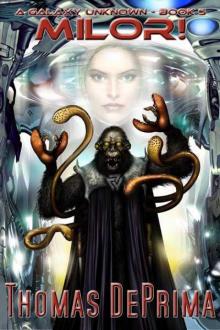 Milor!
Milor! New Title 1
New Title 1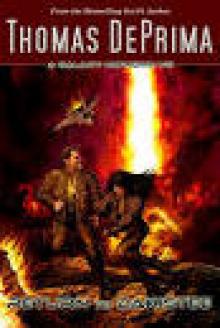 Return to Dakistee (A Galaxy Unknown, Book 8)
Return to Dakistee (A Galaxy Unknown, Book 8)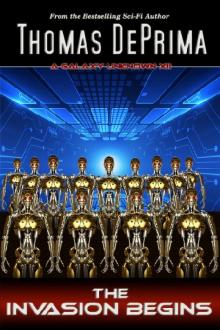 The Invasion Begins
The Invasion Begins When the Spirit Calls (When the Spirit... series - Book 2)
When the Spirit Calls (When the Spirit... series - Book 2)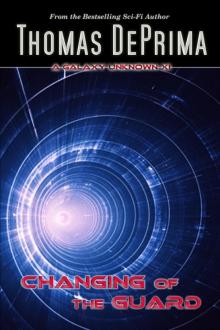 Changing of the Guard (A Galaxy Unknown - Book 11)
Changing of the Guard (A Galaxy Unknown - Book 11) When The Spirit Moves You
When The Spirit Moves You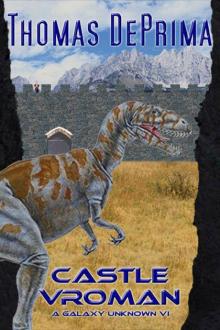 Castle Vroman
Castle Vroman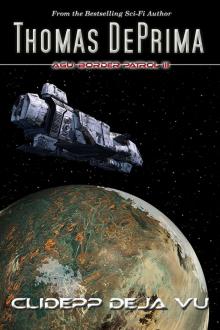 Clidepp Deja Vu
Clidepp Deja Vu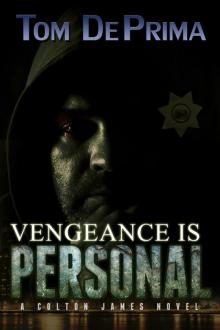 Vengeance Is Personal (A Colton James Novel, Book 2)
Vengeance Is Personal (A Colton James Novel, Book 2)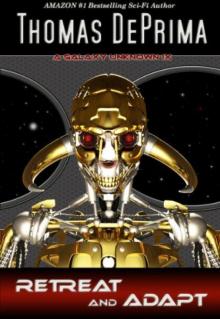 Retreat and Adapt
Retreat and Adapt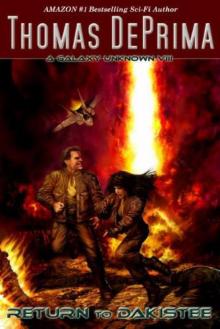 Return to Dakistee
Return to Dakistee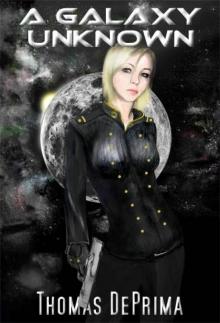 A Galaxy Unknown
A Galaxy Unknown